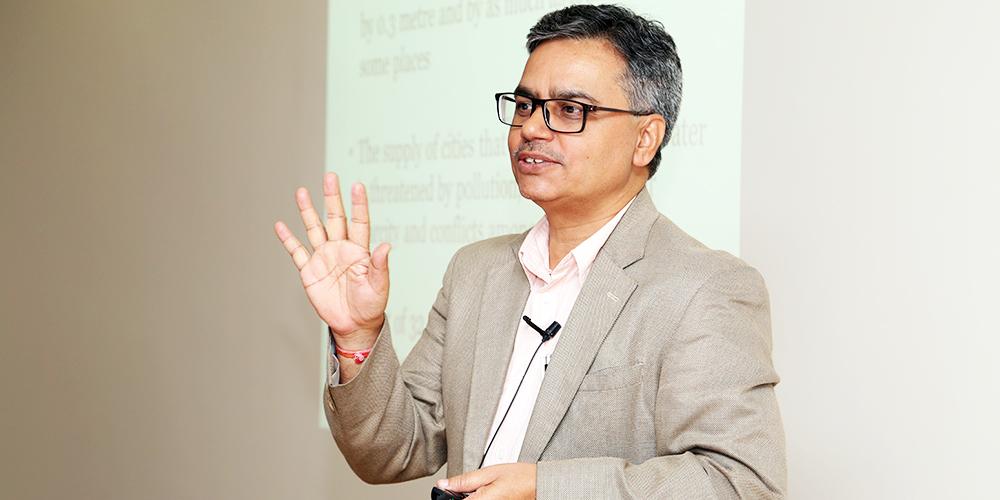Preserving Groundwater, Recycling Greywater in Mumbai

The water table in India has been falling on an average by 0.3 meter and by as much as 4 meters in some places. Of the 32 major cities in the country, 22 face an acute shortage of water supply everyday.
It is with these sobering statistics that Dr. Rakesh Kumar, the Director at the CSIR-National Environmental Engineering Research Institute (NEERI) launched his Public Lecture on grey-water recycling for the city of Mumbai on April 12, 2017. The lecture, hosted by the Columbia Global Centers | Mumbai, was the second in a series of our programs to address the crucial issue of Groundwater Management in India.
Dr. Kumar offered grey-water recycling as a potential solution for urban areas to address their acute water shortages. He defined grey-water as all the water used in households (in kitchens, showers, sinks and washing machines) except for that used in toilets and garbage disposal. The reclaimed water could be put to diverse uses such as construction, firefighting, toilet flushing, watering of public parks, and roads, and for commercial purposes such as car washing, laundry, or window cleaning.
The reuse of grey-water is already standard practice in many countries. In Tokyo, it is mandatory for buildings with an area of over 30,000 square meters to reuse 100 cubic meters of water per day. Spain has passed regulations to promote grey-water reuse in multistoried buildings. In contrast, India has initiated grey-water recycling on a smaller scale, often at the initiative of corporates or individual housing societies. Local governments in Indian cities are yet to actualize grey-water recycling at a city-wide level.
Dr. Kumar explained how grey-water reuse could help residential buildings save up to 35-40% of water consumption and reach their Green Ratings certification goals. From an urban development perspective, grey-water reuse decreases the demand for freshwater, lowers the discharge of wastewater into the environment, and helps to recharge the groundwater table. Dr. Kumar allayed popular safety concerns by citing studies which showed that grey-water in these settings usually has only around 1% contaminants that can be easily removed.
There are however, challenges in implementation that will need to be navigated in cities like Mumbai. Dr. Kumar explained that grey-water recycling required segregation of grey-water components from sewage water, which isn’t standard plumbing practice in most cities. If grey-water recycling was to be initiated on a macro scale, cities would also need to upgrade their sewerage system which in turn would involve a high investment for governments.
As a way forward, he proposed development of policy instruments to support grey-water reuse, a need for more research in comparative grey-water treatment technologies, and the development of appropriate financing approaches for all classes of society.
The lecture was filled to capacity with academics, architects, water technologists, civil society groups, and researchers. The program was also covered in an article in The Hindu the following day.